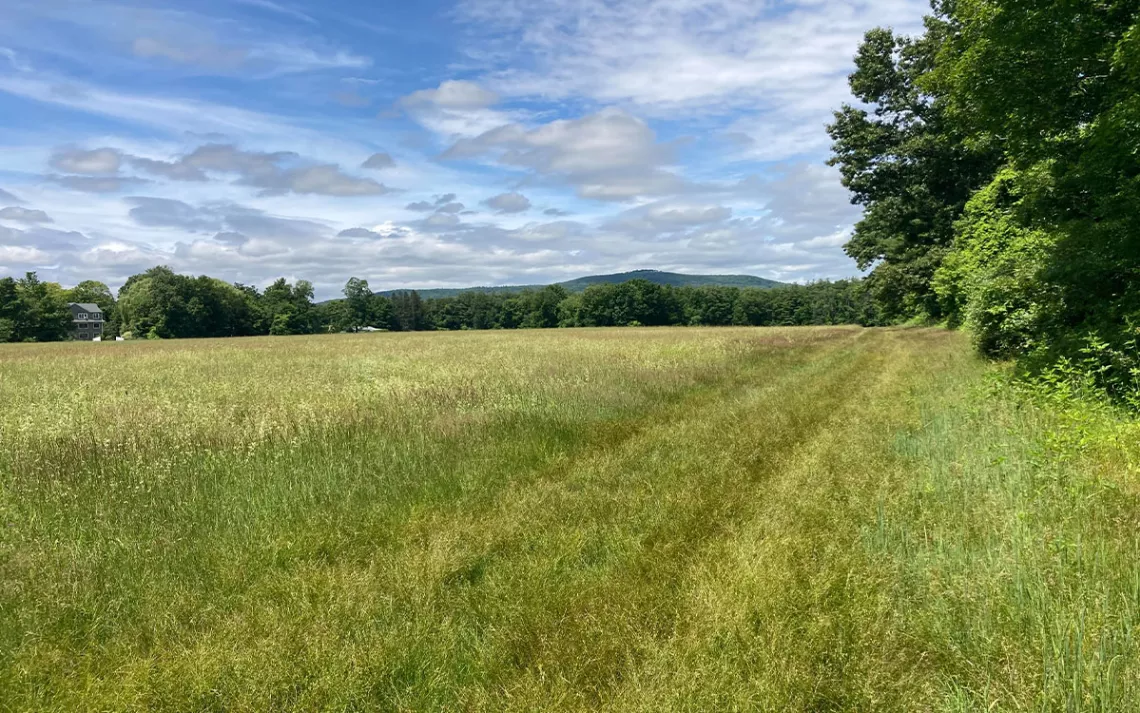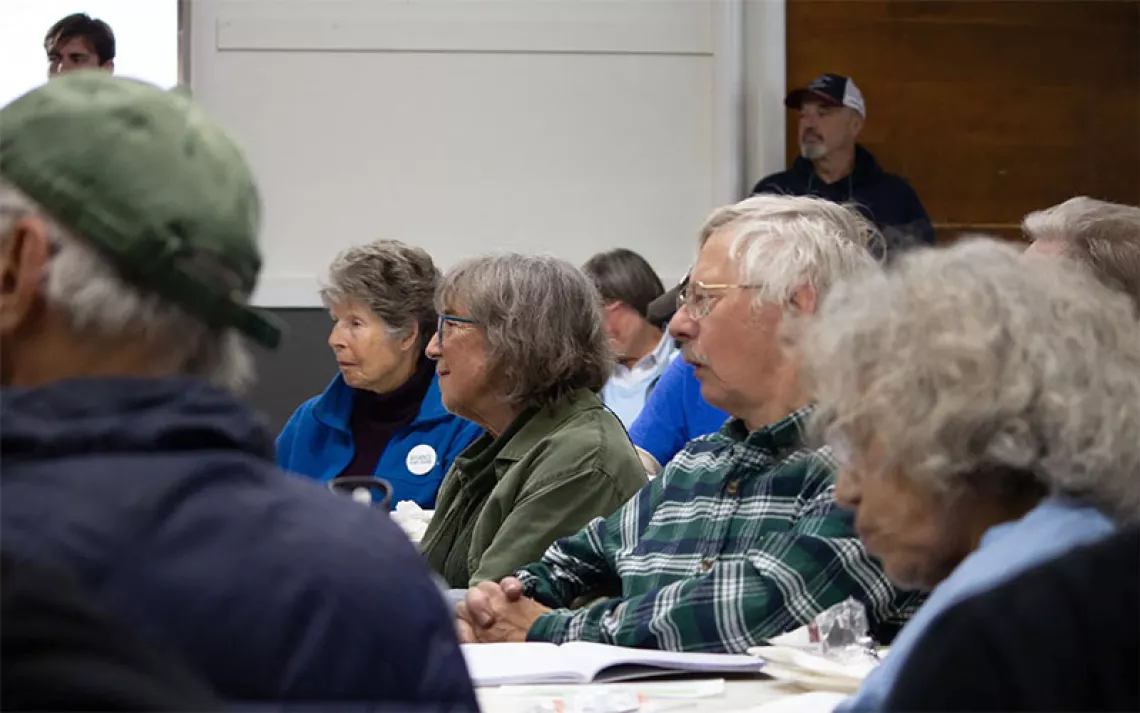Massachusetts Land Trust to Tackle Affordable Housing and Land Conservation in One Project
The movement to address land use issues is growing across the country

Land in Easthampton, Massachusetts, that will be mostly conserved, with a smaller parcel set aside for an affordable housing development. The project upends the notion that these initiatives are at odds. | Photo courtesy of Mark Wamsley/Kestrel Land Trust
In Easthampton, Massachusetts, there isn’t much open land left. The area’s housing shortage means that most unprotected areas are attractive lots for real estate developers to add stock to this post-industrial artist’s haven, where old mill buildings house studios turning out pottery and paintings and new restaurants and microbreweries. The skyrocketing demand for housing then prices out land conservationists who aim to protect wildlife and air and water quality, and connect residents with nature. A new project in the city seeks to overcome the either-or narrative between sprawling cul-de-sacs and conservation, a shift rippling throughout the conservation movement. On a 53-acre parcel of land in this former mill town, Kestrel Land Trust will conserve 42 acres and will work with a partner organization to develop the other 11 acres into affordable housing.
“We’re dealing with a climate crisis, a biodiversity crisis, and a housing crisis all at the same time,” said Mark Wamsley, conservation director at Kestrel Land Trust. “The effectiveness of the projects—both in terms of addressing the various crises as well as their practicality and feasibility—might be better if we focus on all of them at the same time.”
In recent years, land trusts across the country have begun to reevaluate their historically narrow missions, which prioritize traditional land conservation, and to consider how they can better serve all members of their community. As workers at land trusts began to watch local residents and their own colleagues struggle to afford housing, this shift in priorities has increasingly led to more collaboration between conservation land trusts and affordable housing organizations. Kestrel received an anonymous donation specifically earmarked for such collaboration.
“I think [the donor] was reading the tea leaves in this particular community,” Wamsley said.
Conservation land trusts acquire and manage land or conservation easements, which are agreements between landowners and trusts, or governments, that put permanent protections on land. Some critics say this takes land needed for housing out of circulation, thus worsening a housing crisis that disproportionately impacts marginalized groups. Collaboration between conservation land trusts and affordable housing groups is sometimes difficult due to past disagreements and cultural differences between the two groups.
Most of the housing options in Easthampton are large farm houses or old mill housing in poor condition, Mayor Nicole LaChapelle said. A report published in 2021 found that more than half the renters in the area are “cost burdened” and spend more than the recommended 30 percent of their income on housing, but longtime residents were hesitant to support developments that changed the city’s small-town feel. In order to maintain a sustainable local economy, LaChapelle’s administration knew it needed to look for new, innovative opportunities for affordable housing upon taking office, when Kestrel’s novel plan landed on her desk.
“It sounds like a hyperbole, but it’s kind of a dream come true,” said LaChapelle.
Kestrel’s partner in this new mission is the Community Builders, a national nonprofit that develops and manages affordable housing. It already owns a senior living community adjacent to the parcel earmarked for this collaboration, allowing for intergenerational connection, in addition to the other benefits of the project.
Kestrel’s conservation acreage will protect forests, floodplains, and a tributary of the Connecticut River, while the Community Builders will develop 87 affordable rental units. The low-income housing tax credit will help finance the project, making the units affordable to people making 60 percent of the area’s median income or less. Residents will pay 30 percent of their monthly income for rent.
The public conservation area will include accessible trails for residents of the affordable housing community and the senior housing complex nearby. The housing development will have solar panels and all-electric utilities and be built with materials that use zero or low amounts of chemicals known to worsen air quality. It will have sustainable flooring materials and native plants for landscaping. A nearby bus stop will allow residents to access the downtown and wider area.
Collaborations between land trusts and affordable housing organizations are often difficult due to zoning laws. Robb Johnson, executive director of the Massachusetts Land Trust Coalition, said that despite the reputation New England towns have for closely clustered housing, the zoning laws in place largely support low-density, single-family homes. The collaboration between Kestrel Land Trust and the Community Builders, like many similar projects, will require a state zoning permit for affordable housing.
A few organizations were early adopters of aligning these dual motives decades ago. Athens Land Trust, founded in 1994 in Athens, Georgia, is one of the few land trusts in the county that operates as both a community land trust, which obtains land for affordable housing, and a conservation land trust. The Vermont Housing and Conservation Board, established in 1987, distributes grant funding to nonprofits for conservation and affordable housing projects.
As land-conservation projects that include affordable housing continue growing in popularity across the country, it can be an intimidating project to take on for both sectors, said Forest King-Cortes, director of community-centered conservation at the Land Trust Alliance. Responding to interest in the topic, he coauthored a guide that helps land trusts learn more about ways to partner with affordable housing groups.
“What we’ve heard is that for a long time, many land-conservation leaders have been thinking about affordable housing,” King-Cortes said. “I think that commitment from land trusts—to learn more in this space, so that they can act more—has really grown.”
 The Magazine of The Sierra Club
The Magazine of The Sierra Club



